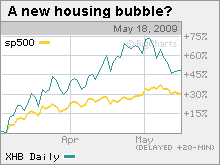Wall Street throws a house party
Stocks surged after the CEO of Lowe's mentioned 'signs of a bottom' in housing. But even if the worst is over, the market may need to stabilize before it recovers.

 |
| Shares of housing related companies have outperformed the broader market during this big two-month rally. |
NEW YORK (CNNMoney.com) -- Is the worst really over for the housing market? The head of the nation's second-largest home improvement retailer seems to think so. Apparently, so does Wall Street.
Lowe's CEO Robert Niblock issued a fairly upbeat assessment of the housing market on Monday, when the company announced first quarter earnings that, while down 22% from a year ago, topped forecasts.
"In recent weeks we have seen consumer confidence improve, housing turnover show signs of a bottom in certain markets, and home prices slow their decline," Niblock said.
In addition, the company issued profit targets that were ahead of Wall Street's estimates.
Investors cheered the news. Shares of Lowe's (LOW, Fortune 500) soared 6% Monday morning, helping to lift the overall stock market higher. Lowe's top competitor, Dow component Home Depot (HD, Fortune 500), gained more than 5%.
Home Depot will report its first quarter results Tuesday morning. So it will be very interesting to see if Home Depot CEO Frank Blake shares Niblock's optimism.
He'd better. The monstrous stock market rally since March has been predicated largely on hopes that the economy is, in fact, close to hitting bottom. And housing-related stocks have led the way.
Shares of Home Depot and Lowe's have each gained more than 40% since the market hit its low point of the year two months ago. And the SPDR S&P Homebuilders (XHB) ETF, an exchange-traded fund that includes both retailers as well as most of the nation's top homebuilders, is up more than 50%.
These stocks have been soaring due to expectations that the worst is over for the economy. A merger between builders Pulte Homes (PHM, Fortune 500) and Centex (CTX, Fortune 500) has also created some enthusiasm for the group as investors bet on other potential takeover targets.
But investors may be getting ahead of themselves, which is a worrisome sign.
Luxury homebuilder Toll Brothers (TOL) reports preliminary results for its fiscal second quarter on Wednesday. Analysts are predicting a more than 50% drop in revenue.
What's more, when looking at Lowe's results, investors appear to have honed in on Niblock's comments about a possible recovery but overlooked his more cautious remarks.
Niblock said that "economic pressures on consumers remain intense, and bigger ticket projects continue to be postponed as wary home improvement consumers watch the economic climate and housing market dynamics very closely."
To be sure, the fact that Lowe's still felt comfortable enough to raise its earnings guidance is encouraging. And there are other signs of life in the housing market.
The Federal Reserve has done its best to keep long-term interest rates relatively low. That has helped put a lid on mortgage rates, which makes it cheaper for people that can get a mortgage to actually buy a home. So it's understandable why some think the worst is in fact over.
"Mortgage rates are low. Home prices are low. Affordability is high. It's at the point in most markets where it might be a good time to buy," said Kurt Karl, chief U.S. economist with Swiss Re.
But people still need to be cautious. In order to really make the case that the real estate market, and hence the economy, is getting better, housing prices need to stabilize and the spate of foreclosures that has plagued many markets needs to stop.
That hasn't happened yet. Home prices fell 14% year-over-year in the first quarter. Foreclosures in April rose 32% from a year ago and 1% from March to hit another record high.
Andrew Busch, global currency strategist with BMO Capital Markets, wrote in a note to clients Monday morning that foreclosures may not have peaked yet, especially when you consider that unemployment is probably going to keep rising.
"We know that more loan defaults are coming to the housing sector," Busch wrote. "This will continue to put downward pressure on prices and downward pressure on securities linked to the housing sector. While one can argue that we may have seen the worst already for the housing sector, we certainly can't say that the adjustment process is over."
Karl agreed that there is a difference between the housing market hitting bottom and an actual full-blown recovery.
"I would expect the housing market to bounce back slowly. It's going to take a while since there is still a big overhang of new homes. It's going to be a slow slog," he said.
It's clear that the mess in housing helped bring about this recession and is a major reason why many banks were hit so hard in the past year. So instead of rushing to declare that the worst is finally over even when prices are still falling and foreclosures continue to inch higher, it might be wise for investors and consumers to wait for actual evidence of a bottom first.
Update: Greetings Buzz readers. There is a new way to post comments for this column. If you have a Facebook account, you can submit your feedback using the Facebook Connect feature that will appear at the bottom of the page. If you don't have one, it is free to sign up.
The good news is that reader comments will now appear immediately and on the same page as the column as opposed to a separate page. I trust that loyal Buzz readers will continue to actively share their thoughts with this new feature. And rest assured, I will still be using the best reader reaction as fodder for video installments of The Buzz.
So with that in mind, here is today's question for readers. Do you think the housing market has hit bottom yet? ![]()

